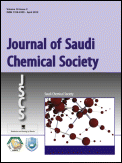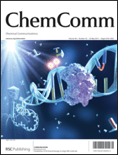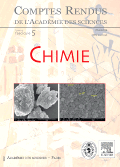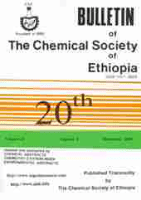
RSC Advances
Scope & Guideline
Elevating Research Standards in the Heart of Cambridge
Introduction
Aims and Scopes
- Materials Science and Engineering:
Focuses on the design, synthesis, and characterization of novel materials, including nanomaterials, polymers, and composites, emphasizing their applications in energy, electronics, and healthcare. - Environmental Chemistry and Sustainability:
Covers research on environmental pollutants, waste management, and sustainable practices, including the development of green technologies and materials for pollution remediation. - Medicinal Chemistry and Drug Development:
Explores the synthesis, characterization, and biological evaluation of pharmaceutical compounds, drug delivery systems, and therapeutic agents, with an emphasis on innovative approaches to combat diseases. - Nanotechnology and Nanomaterials:
Investigates the synthesis, properties, and applications of nanostructured materials, including their role in catalysis, sensing, and drug delivery, as well as their environmental impact. - Computational Chemistry and Theoretical Studies:
Engages in theoretical modeling and computational studies to predict the behavior of new compounds and materials, offering insights into their structure, reactivity, and potential applications. - Chemical Engineering and Process Optimization:
Focuses on the development and optimization of chemical processes, including reaction engineering, separation processes, and the utilization of biocatalysts.
Trending and Emerging
- Sustainable and Green Chemistry:
An increasing emphasis on sustainability and environmentally friendly practices, including the development of green catalysts, renewable materials, and waste recycling methods, is becoming a significant trend. - Advanced Drug Delivery Systems:
Research into novel drug delivery mechanisms, including nanocarriers and smart hydrogels, is on the rise, particularly in the context of targeted and controlled drug release for cancer treatment. - Photocatalysis and Environmental Remediation:
The application of photocatalytic materials for the degradation of pollutants and wastewater treatment is gaining momentum, reflecting a growing concern for environmental sustainability. - Machine Learning in Chemistry:
The integration of machine learning techniques to predict material properties, optimize chemical processes, and design new compounds is emerging as a robust area of research. - Biomaterials and Tissue Engineering:
There is a notable increase in research focused on biocompatible materials, hydrogels, and scaffolds for tissue engineering and regenerative medicine applications. - 2D Materials and Their Applications:
The exploration of two-dimensional materials, such as graphene and transition metal dichalcogenides, for various applications including electronics, photonics, and energy storage is rapidly expanding.
Declining or Waning
- Traditional Organic Synthesis:
Research involving classical organic synthesis methods is becoming less prominent, as there is a shift towards greener and more efficient synthetic pathways, such as those utilizing nanomaterials or biocatalysts. - Inorganic Chemistry without Functional Applications:
There is a noticeable decrease in publications focusing solely on inorganic chemistry without practical applications, as the field increasingly emphasizes the integration of inorganic compounds into functional materials. - Basic Theoretical Studies:
Papers focusing on basic theoretical chemistry without application or practical relevance are less common, as the journal encourages research that demonstrates real-world applications or interdisciplinary connections. - Low-Efficiency Energy Conversion Systems:
Research on traditional energy conversion systems that lack innovation or efficiency improvements is waning, with more focus shifting towards sustainable and high-efficiency alternatives. - Single-Discipline Studies:
As the journal aims to promote interdisciplinary research, studies that remain strictly within a single discipline without connections to broader applications are declining.
Similar Journals

Journal of Saudi Chemical Society
Empowering Chemists Through Open Access Innovation.The Journal of Saudi Chemical Society, published by ELSEVIER, stands as a premier platform for advancing knowledge in the field of chemistry. Since its inception in 2009, this Open Access journal has garnered significant attention, securing a prestigious Q1 ranking in the Chemistry (miscellaneous) category for 2023, reflecting its position among the top journals in the discipline. With an impressive Scopus ranking of #66 out of 408 in General Chemistry, this journal boasts a commendable 83rd percentile, underscoring its impact and relevance in the global research community. The journal aims to disseminate high-quality research articles, reviews, and case studies, fostering innovation and collaboration among chemists and allied professionals. By enabling widespread access to cutting-edge research, the Journal of Saudi Chemical Society plays a crucial role in supporting the educational and professional development of students, researchers, and practitioners alike, making it an essential resource for anyone invested in the dynamic field of chemistry.

Chemical Engineering Journal Advances
Elevating Chemical Engineering Knowledge through Quality Research.Chemical Engineering Journal Advances, published by Elsevier, is a premier open-access journal dedicated to advancing research and innovation in the field of chemical engineering. With its inception in 2020, the journal has quickly established itself as a key player in disseminating high-quality, peer-reviewed articles, boasting an impressive Q1 ranking in Chemical Engineering and related disciplines for 2023. The journal covers a broad spectrum of topics, including industrial processes, environmental chemistry, and innovative manufacturing techniques, making it essential reading for researchers and professionals aiming to stay at the forefront of chemical engineering advancements. With its commitment to open access, Chemical Engineering Journal Advances ensures that groundbreaking research is readily available to the global scientific community, fostering collaboration and knowledge exchange. Situated in the Netherlands, the journal supports its authors with a robust platform for impactful research dissemination, highlighted by a solid position in the Scopus ranks, indicating its influence and relevance in the field.

CHEMICAL COMMUNICATIONS
Fostering collaboration in the world of materials science.Chemical Communications, published by the esteemed Royal Society of Chemistry, is a prominent journal within the field of chemical science, focusing on the dissemination of cutting-edge research in a variety of sub-disciplines including catalysis, materials chemistry, and electronic materials. Operating without an open access model, this journal provides critical insights from contributors around the globe, enhancing our understanding of complex chemical interactions and innovative applications. Ranked in the top quartile for several categories such as Ceramics and Composites, and Metals and Alloys, Chemical Communications boasts impressive Scopus rankings, securing strong positions across multiple fields and showcasing its influence within the scientific community. The journal is committed to advancing knowledge and fostering collaboration among researchers, professionals, and students, making it an invaluable resource for those looking to stay abreast of the latest advancements in chemistry and materials science. With a publication history dating back to 1965 and continuing into 2024, its rich archive serves as a vital repository of chemical research and development.

Eurasian Chemico-Technological Journal
Catalyzing Global Dialogue in Chemical and Technological AdvancementsEurasian Chemico-Technological Journal, published by the Institute of Higher Education Academy of Sciences in Kazakhstan, serves as a dynamic platform for scholars and professionals engaged in the interdisciplinary fields of chemical engineering, chemistry, condensed matter physics, and materials science. Since its inception in 1999, the journal has embraced an open access model, enabling broad dissemination of research findings and fostering collaborative innovation across borders. With an ISSN of 1562-3920 and a converged publication schedule extending from 2007 to 2024, it continues to contribute to the global academic dialogue, despite its current standing in Q4 quartiles across several categories on Scopus. The journal ranks in the lower percentiles within its respective fields, yet it remains a valuable resource for emerging research and perspectives within the scientific community. This journal is essential for both seasoned researchers and students, as it reflects the evolving landscape of chemico-technological research while promoting engagement with contemporary issues in the sciences.

COMPTES RENDUS CHIMIE
Pioneering Research Trends in Chemistry and Chemical Engineering.COMPTES RENDUS CHIMIE, published by the prestigious Académie des Sciences in France, stands as a significant journal in the fields of chemistry and chemical engineering. With an ISSN of 1631-0748 and an E-ISSN of 1878-1543, this open-access journal has been committed to disseminating high-quality research since its transition to open access in 2020. Featuring a diverse array of studies, the journal covers innovative research trends and applications, while maintaining a Q3 category ranking in both Chemical Engineering (miscellaneous) and Chemistry (miscellaneous) as of 2023. Its Scopus rankings, positioning at #251 out of 408 in general chemistry and #169 out of 273 in general chemical engineering, highlight its growing impact within the scientific community. Authored by a global cohort of scientists and researchers, COMPTES RENDUS CHIMIE is dedicated to the advancement of knowledge and sharing insights that are vital for ongoing research and development in the chemical sciences. Located in the heart of Paris at 23 Quai de Conti, 75006, France, the journal is an essential resource for those passionate about chemistry and engineering disciplines, fostering collaboration and innovation across the world.

RUSSIAN CHEMICAL REVIEWS
Shaping the Future of Chemical ResearchRUSSIAN CHEMICAL REVIEWS, published by the esteemed ND Zelinsky Institute of Organic Chemistry, RAS, stands as a prominent platform for disseminating high-quality research in the diverse field of chemistry. With an ISSN of 0036-021X and an E-ISSN of 1468-4837, this journal has earned its place in the Q1 quartile of Chemistry (miscellaneous) for 2023, reflecting its outstanding impact and rigorous peer-review process. The journal encompasses a wide array of topics within chemistry, providing critical reviews that advance understanding and foster collaboration among researchers, professionals, and students globally. With its consistent publication since 1970, RUSSIAN CHEMICAL REVIEWS not only serves as a valuable resource for the latest advancements in the field but also plays a crucial role in shaping future research directions. The journal is based in the Russian Federation, with its office located at 47 Leninsky Pr, Moscow 119991, RUSSIA. As an essential reference for those in the chemical sciences, it provides an ideal avenue for authors looking to publish impactful reviews that contribute to the broader scientific community.

Journal of the Iranian Chemical Society
Connecting Chemists to Drive InnovationThe Journal of the Iranian Chemical Society, published by SPRINGER, is a prominent academic journal dedicated to advancing the field of chemistry. With an ISSN of 1735-207X and an E-ISSN of 1735-2428, this quarterly journal has been contributing valuable research from 2006 to 2024. Situated in Germany, it serves as a vital platform for chemists and researchers to disseminate their findings, particularly within the miscellaneous chemistry category, where it ranks in the Q3 quartile for 2023. Despite its current lack of open access options, the journal maintains a solid presence in the academic community, evidenced by its Scopus ranking of #165 out of 408 in general chemistry and a commendable 59th percentile. The journal's objective aims to foster innovation and collaboration in chemical research, making it an essential resource for professionals and students keen on pioneering developments in the field. As a subscriber, you will gain insights into cutting-edge research that drives the future of chemistry.

BULLETIN OF THE CHEMICAL SOCIETY OF ETHIOPIA
Driving Knowledge Forward in the World of ChemistryBULLETIN OF THE CHEMICAL SOCIETY OF ETHIOPIA (ISSN: 1011-3924; E-ISSN: 1726-801X), published by the Chemical Society of Ethiopia, serves as a pivotal platform for the dissemination of innovative research and developments within the field of chemistry. Since its inception in 1996 and now an open access journal since 2012, it has provided researchers, academics, and students with unrestricted access to critical studies and findings, thus fostering collaboration and the advancement of knowledge in the discipline. The journal's current standing in the Q3 quartile in the 2023 Chemistry category underlines its commitment to maintaining high academic standards, while its Scopus ranking, positioned at #250 out of 408 in general chemistry, showcases its growing influence and contribution to the scientific community. Hailing from Ethiopia and targeted toward a global readership, the journal aims to highlight local and international research, engaging scholars and practitioners alike in discussions that propel the science of chemistry forward.

Reactions is a dynamic open-access journal published by MDPI, dedicated to the advancement of research in the fields of Chemical Engineering and Chemistry. Launched in 2020, the journal aims to provide a platform for scientists and researchers to share their findings and innovations, facilitating the synthesis and dissemination of knowledge within the global academic community. With an impact factor that reflects its growing influence, Reactions ranks 47th in the Chemical Engineering category and 72nd in Chemistry on Scopus, placing it within the vibrant landscape of contemporary chemical research. Housed in the picturesque city of Basel, Switzerland, the journal is committed to open access, ensuring that its high-quality content is readily available to all. This commitment not only enhances visibility but also fosters collaboration among researchers, professionals, and students striving to push the boundaries of chemical sciences. As we look towards 2024 and beyond, Reactions continues to encourage submissions that explore groundbreaking methodologies, innovative applications, and transformative theoretical frameworks in chemistry and chemical engineering.

Frontiers of Chemical Science and Engineering
Connecting Researchers for Global ImpactFrontiers of Chemical Science and Engineering is an esteemed journal published by SPRINGER, dedicated to advancing the rapidly evolving domain of chemical engineering. Located in New York, USA, this journal provides a vibrant platform for disseminating groundbreaking research and innovative methodologies in the field. With an impressive Q1 ranking in Chemical Engineering and a Scopus ranking of 54 out of 273, it occupies a prominent position, reflecting its high impact and relevance among academic circles. Since its inception in 2011, it has fostered interdisciplinary collaboration, encompassing diverse topics such as process engineering, environmental sustainability, and nanotechnology, making it a vital resource for researchers, professionals, and students alike. The journal's open access policy further enhances accessibility, ensuring that cutting-edge research is readily available to a global audience. As the field continues to evolve, contributions to Frontiers of Chemical Science and Engineering play an essential role in shaping future advancements and empowering the next generation of engineers.